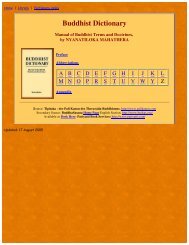Night and Morning with Bhikkhu Tissa
Night and Morning with Bhikkhu Tissa
Night and Morning with Bhikkhu Tissa
- No tags were found...
Create successful ePaper yourself
Turn your PDF publications into a flip-book with our unique Google optimized e-Paper software.
Gene: Well, the first two are clear enough to me. Killing living beings or stealing is bad kamma whichmust bring bad results. But what about the third? I thought it was just refraining from committing adultery.<strong>Bhikkhu</strong> <strong>Tissa</strong>: That is the principal application. Sensual desires are desires for the various objects of ourvarious senses. Lust <strong>and</strong> passion can arise in many ways. But here the Buddha is referring specifically tosexual desire, which is such a driving passion in human beings. It needs to be watched <strong>and</strong> governedcarefully. A follower of the Dhamma should not have any sexual relations <strong>with</strong> anyone else’s wife or husb<strong>and</strong>.He or she should not commit adultery. Moreover, one must not have sexual relations <strong>with</strong> any otherunderage, unsuitable, dependent persons. It follows that one must refrain from seducing or coercing anyonesexually. To put it in positive terms, one should be honorable <strong>and</strong> respectful of others in such matters.Gene: I’m afraid that killing <strong>and</strong> stealing <strong>and</strong> sexual misbehavior are all too common in this world.<strong>Bhikkhu</strong> <strong>Tissa</strong>: Yes, <strong>and</strong> on account of them living beings suffer tremendously. Right action, then, isabstaining from these harmful actions <strong>and</strong> cultivating instead harmlessness, respect for others’ property, <strong>and</strong>integrity regarding sexuality. These principles are very broad, you can see, <strong>and</strong> require us to be thoughtful<strong>and</strong> self-controlled in all aspects of our lives.Gene: One thing I notice is that if people would practice these factors of the path diligently it would bevery beneficial to others, to society as a whole, as well as to themselves. It looks like these teachings wouldpromote good in the world as well as good in the individual.<strong>Bhikkhu</strong> <strong>Tissa</strong>: The way of Dhamma always promotes the happiness <strong>and</strong> security of living beings. Ourconscious actions through body, speech, <strong>and</strong> mind are significant; we are responsible for them; so we ought topay attention to them <strong>and</strong> try to develop the wholesome <strong>and</strong> ab<strong>and</strong>on the unwholesome.Gene: I’m a little unclear as to what actually constitutes the wholesome <strong>and</strong> the unwholesome. And also,you said something before about “roots.”<strong>Bhikkhu</strong> <strong>Tissa</strong>: Unwholesome, bad actions are those that arise from the three unwholesome roots. Theseare greed, hatred, <strong>and</strong> delusion. We have these defilements deep in our minds, <strong>and</strong> when we act on them wecommit unwholesome actions which will harm ourselves <strong>and</strong> others. There are also three wholesome roots.These are non-greed, non-hatred, <strong>and</strong> non-delusion—the exact opposites. In positive terms: liberality, goodwill, <strong>and</strong> wisdom. When our actions arise from these roots we call them wholesome actions.Gene: Aren’t people often ignorant or unaware of these roots?<strong>Bhikkhu</strong> <strong>Tissa</strong>: Yes. We might not pay attention, or we might not admit the real sources of our actions, butthat doesn’t change their true character. We should therefore try to look closely <strong>and</strong> honestly to distinguish thegood from the bad, <strong>and</strong> then act judiciously.Gene: These factors of the Noble Eightfold Path that you are describing are much wider than I hadthought. They seem to cover every aspect of human life.<strong>Bhikkhu</strong> <strong>Tissa</strong>: Both ordinary <strong>and</strong> extraordinary things must be considered by one who wants to travelthe path all the way to deliverance. The fifth factor of the path, right livelihood, shows that the Buddha did notoverlook the importance even of how we make our living.Gene: Why should something as routine as a job be so important?<strong>Bhikkhu</strong> <strong>Tissa</strong>: Because it also involves our intentional action—repeated action <strong>and</strong> habitual action. Ourlivelihood is a major part of life <strong>and</strong> a focus of our interests <strong>and</strong> energies. Basically, to have right livelihoodmeans to earn our living through respectable <strong>and</strong> honorable means, not causing loss or harm to living beings.We must abstain from all kinds of deceit, fraud, trickery, <strong>and</strong> avarice. We should be devoted to honesty <strong>and</strong>fair dealing.Gene: At least I don’t have to worry about this too much right now. My present job is pretty benign <strong>and</strong>the people I work <strong>with</strong> are mostly all right. But I’ve never given much thought to being ethical in this way.<strong>Bhikkhu</strong> <strong>Tissa</strong>: We are going to receive the results of our own actions, so it’s important to pay attention towhat we are doing <strong>and</strong> to make sure we are behaving properly.Gene: Venerable sir, I can see that Buddhism lays great stress on individual responsibility. We are free tostrive for enlightenment, <strong>and</strong> we are encouraged to do so. At the same time we are responsible for what we19
















